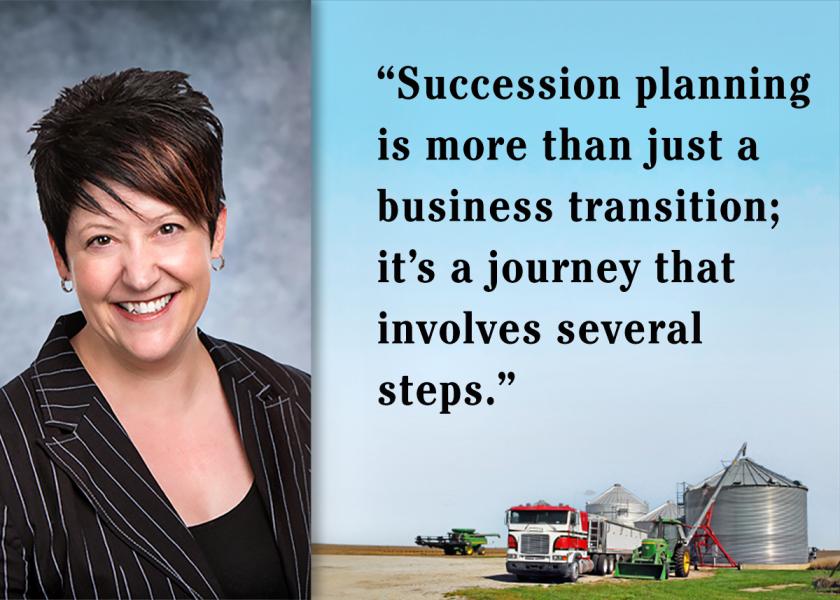Overcome Family Dysfunction with the 3 C’s

Passing down a family farm from one generation to the next is as old as agriculture itself. It is both a dream and a responsibility. However, the path from one generation to the next is often fraught with challenges, conflicts and family dysfunction. Succession planning in the context of a family farm is more than just a business transition. It’s a journey that involves several critical steps.
Successful succession planning must revolve around consensus, commitment and the consequences of the decisions made.
Step 1: Consensus
Consensus is the cornerstone of any successful succession plan. In the context of a family farm, consensus means achieving a shared vision and understanding among all family members involved in the transition. Here are key considerations:
- Have Open and Honest Communication. Family members must openly discuss their aspirations, expectations and concerns. Encouraging dialogue ensures that everyone’s opinions are heard and respected. Though this can be challenging, as family dynamics have potential to lead to misunderstandings and miscommunications, it is a vital first step.
- Develop a Shared Vision. The family should work together to create a shared vision for the future of the farm. It should encompass not only the economic goals but also the values, principles and long-term objectives the family wants to preserve and promote.
- Define Roles and Responsibilities. Establishing clear roles and responsibilities is essential to avoid conflicts and confusion. Each family member’s contributions and expectations should be outlined with their defined role in the farm’s future. This clarity helps mitigate potential disputes later on.
- Seek Professional Guidance. Family farm succession planning requires legal, financial and tax expertise. Engaging professionals, such as lawyers and financial advisers, can help navigate complexities and ensure the succession plan adheres to legal and tax requirements.
Step 2: Commitment
Consensus is essential, but commitment is the driving force behind a successful plan. Family members need to be committed to the agreed-upon plan and dedicated to its execution. Here are critical aspects of commitment in succession planning:
- Recognize Individual Goals. While consensus is crucial, it is equally essential to acknowledge the individual goals and aspirations of each family member involved in the farm. Commitment should stem from a genuine desire to see these goals fulfilled.
- Set Timelines and Milestones. Establishing a clear schedule of events helps the succession plan progress effectively. Family members should adhere to these timelines, keeping the process on track and avoiding procrastination. It is helpful to identify a succession planning coordinator in the family who is accountable for keeping everyone engaged and on task.
- Be Flexible and Adaptable. Commitment doesn’t mean rigidity. Family farms are dynamic, and unexpected circumstances can arise. Family members must be willing to adapt and make adjustments to the plan as conditions change.
- Create a Family Code of Conduct. A code of conduct should outline acceptable behavior, conflict resolution mechanisms and ethical standards within the family farm. This helps maintain commitment by fostering a healthy and respectful environment.
Step 3: Consequences
Succession planning is not just about the present; it’s about securing the future of the family farm. As such, family members must consider the consequences of their decisions carefully. The decisions made at this stage will have a profound impact on the future of the farm and the family. Here are some critical considerations:
- Financial Implications. The financial consequences of a succession plan are significant. It is essential to understand the financial implications of the plan, including taxes, estate planning and the allocation of assets to prevent financial strain on the farm.
- Emotional and Interpersonal. Consequences. Family dynamics and relationships can be heavily affected in this process. Family members should be prepared for potential conflicts, emotional strain and necessary conflict resolution. It’s important to find healthy ways to address the emotional toll these decisions can take.
- Legacy Preservation. The decisions made in succession planning will determine the legacy of the family farm. It’s crucial for the farm’s history, values and traditions to be preserved, even as new generations take over. Balancing innovation with tradition is a delicate but necessary aspect of the plan.
- Evaluate Sustainability. The successful transition of a family farm is not just about passing down property. It must also ensure the farm’s sustainability for future generations. Decision makers should assess the ability of the next generation of leaders to work well together. This includes not only the ability to make decisions as a team but also the ability to plan for the future while preserving cash flow.
Top Producer Summit Pre-Event Workshop: Take Control Of Your Succession Plan
Date: Monday, February 5, 2024
Time: 8:30 am - 4:30 pm
Family farm succession planning is a complex and emotionally charged process that requires careful consideration of consensus, commitment and consequences. Achieving consensus among family members, committing to the plan and understanding the potential consequences are vital to secure the future of the family farm.
Successful succession planning doesn’t guarantee a smooth or conflict-free transition, but it does provide a structured framework for addressing challenges and disputes as they arise. By implementing strategies such as open and honest communication, clearly defined roles and responsibilities and a shared vision for the future, those involved are able to build a solid foundation for their succession plan. Family members’ commitment to the plan ensures its execution, while flexibility and adaptability allow for adjustments.
Lastly, understanding the plan’s financial, emotional and legacy consequences is essential. With thoughtful consideration, a family can navigate challenges and create a sustainable and prosperous future for their family farm, preserving its traditions and values. Succession planning is more than a business transition; it’s your legacy in the making.







